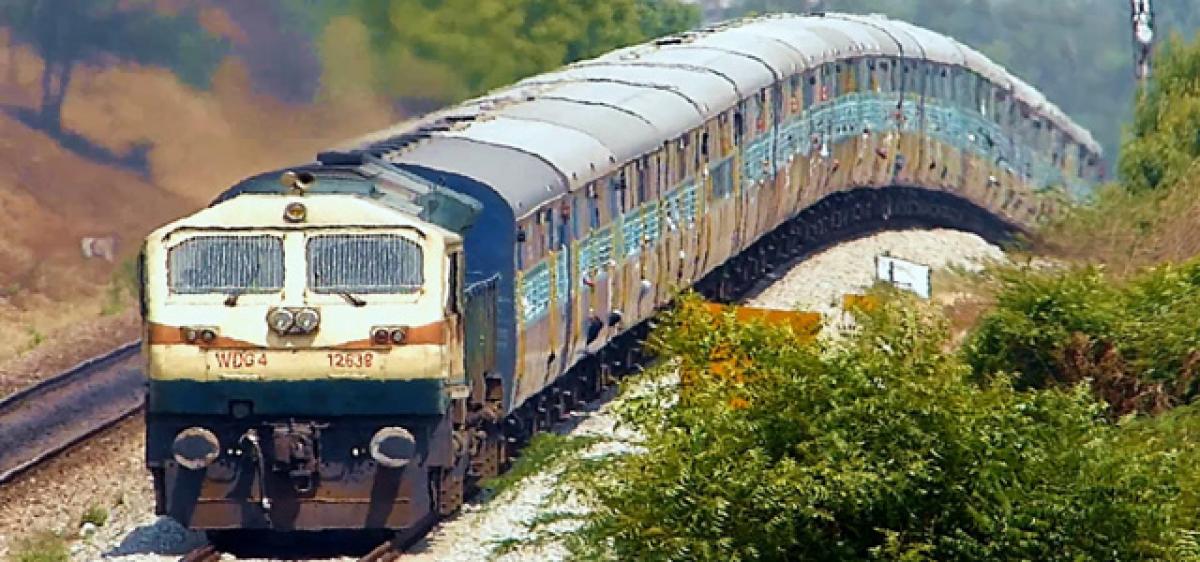Live
- Over 7,600 Syrians return from Turkiye in five days after Assad's downfall: minister
- Delhi BJP leaders stay overnight in 1,194 slum clusters
- Keerthy Suresh and Anthony Thattil Tie the Knot in a Christian Ceremony
- AAP, BJP making false promises to slum dwellers for votes: Delhi Congress
- 'Vere Level Office' Review: A Refreshing Take on Corporate Life with Humor and Heart
- Libya's oil company declares force majeure at key refinery following clashes
- Illegal Rohingyas: BJP seeks Assembly session to implement NRC in Delhi
- Philippines orders full evacuation amid possible volcanic re-eruption
- Government Prioritizes Welfare of the Poor, says Dola Sri Bala Veeranjaneyaswamy
- Two Russian oil tankers with 29 on board damaged due to bad weather
Just In

With the Railway Budget integrated with the coming General Budget, it remains to be seen what importance the world’s largest carrier would get. There are various aspects of the Railways that need urgent attention but these have not been receiving adequate attention.
With the Railway Budget integrated with the coming General Budget, it remains to be seen what importance the world’s largest carrier would get. There are various aspects of the Railways that need urgent attention but these have not been receiving adequate attention. The very fact that even premier trains like Rajdhani, Shatabdi and Duronto had been running hours late due to fog and other related problems like frequent accidents, derailing etc., testifies to the fact that Railways do not have necessary equipment and expertise to tackle these problems.
According to sources in the Rail Ministry, it would have the highest plan outlay of around Rs 1.35 lakh crore in the next financial year from Rs 1.21 lakh crore this fiscal. The national transporter plans to seek Rs 60,000 crore from the Finance Ministry as gross budgetary support and another Rs 25,000 crore from LIC as loan while the remaining amount will be raised by Indian Railways Finance Corporation (IRFC) through bonds, internal resources and public-private partnerships.
Poor finances of the Railways has affected the Railways as it has been stated that over the years there has been no fare increase due to populist policies of political parties. The resource crunch has affected modernizstion of Railways in all fronts and affected its functioning. While accidents are increasing, track renewal is also a related problem. Even where track renewal is being carried out, there is no proper planning and such renewal results in late running of even super fast trains.
The most important area is the modernisation of coaches such as Linke Hoffman Busch (LHB). This has become all the more necessary after the Kanpur accident and it is understood that the Railways would step up production of LHB coaches. It is understood that conventional ICF coaches run for 25 years and costs between Rs 90 lakh and Rs 1.40 crore whereas LHB ones serve around 35 years and cost between Rs 1.8 crore and Rs 2.35 crore. Both the Anil Kakodkar and Sam Pitroda committees had raised objections to continuance of the ICF fleet.
Further revision of fares may make it unviable as sometimes the fares match those on low-cost airlines. Moreover the fares of AC First Class are already equivalent to air fares. There have been very little efforts to raise resources by the Railways. Some of the steps which could be taken include leasing stations to private parties, developing and renting and/or leasing Railway plots near stations or building rest rooms and guest houses in metro stations, stations in tourist spots etc.
Again vendors in stations rarely sell Rail Neer packaged drinking water which needs to be made mandatory as its quality is better and less costly. These and many other steps could help in improving the finances of the Railways. The governance of Railways as also of most government establishments is a vital area that needs to be given special attention. A professional approach has to be inducted in the Railway system. The accountability should be more at the top than those in the lower cadres.
Diverting resources to bullet trains is possibly not needed at this juncture. Even providing wi-fi facilities can wait. The urgent necessity is to concentrate on upgradation and maintenance of tracks to safety and also to increase speed of premier and super trains whose running is slow by global standards and should be steadily increased and also constructing freight corridors. There should be an endeavour to maintain a speed of 120 km per hour. Also the causes of late running of trains should be analyzed by a team of experts and remedial steps taken thereof.
By Dhurjati Mukherjee

© 2024 Hyderabad Media House Limited/The Hans India. All rights reserved. Powered by hocalwire.com







